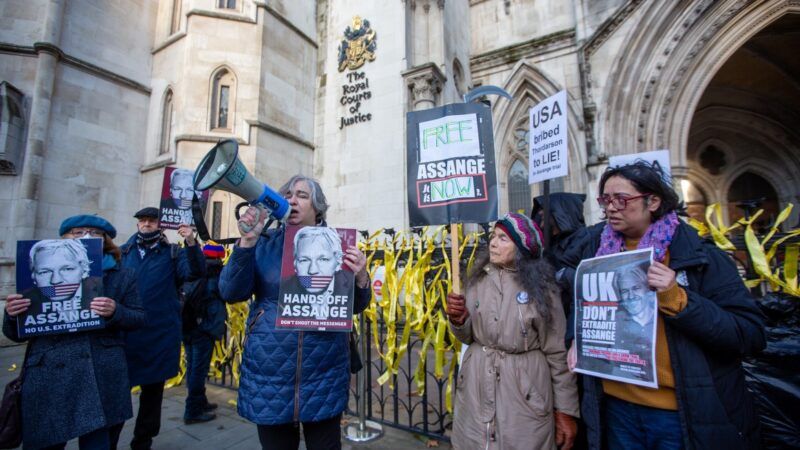U.K. Rules Julian Assange May Be Extradited to the U.S. To Face Espionage Charges
In a significant threat to the free press, WikiLeaks founder Julian Assange faces decades in federal prison for leaking classified documents.

Today, the British High Court ruled that WikiLeaks founder Julian Assange may be extradited to the United States to face Espionage Act charges that could put him in prison for decades for his role in leaking classified documents to the public.
Assange was indicted in 2019 for 17 counts of receiving and disclosing classified U.S. documents (and one count of conspiracy to commit computer intrusion for allegedly helping whistleblower Chelsea Manning access and transmit classified documents to WikiLeaks). Assange had been holed up in the Ecuadorian Embassy in London since June 2012 as he fought extradition efforts by Sweden over allegations of sexual misconduct (which would later be dropped). In 2019, Ecuador dropped Assange's asylum protections, and he was arrested by British police. A month after his arrest, the U.S. Department of Justice unsealed its indictment against Assange.
Assange fought extradition to the United States, and in January 2021, U.K. District Judge Vanessa Baraitser of the Westminster Magistrates' Court ruled in Assange's favor. But this ruling was not based on any sort of respect for the right of journalists to publish information without fear of government punishment. In fact, lower courts had already dismissed such an argument, and Baraitser agreed. Journalists in the United Kingdom and Europe don't have the types of protections that the First Amendment in the United States provides. Instead, Baraitser ruled that America's extremely harsh federal prison system was a threat to Assange's mental health. Out of fears that Assange would end up in solitary isolation, experience further mental decline, and possibly commit suicide, she rejected the extradition.
The U.S. Justice Department assured the U.K. government that wouldn't happen, and two judges with the British High Court, Ian Burnett and Timothy Holroyde, cleared the extradition. American officials promised that Assange would not be put into solitary confinement or sent to the federal high-security prison in Colorado "unless he were to do something subsequent to the offering of these assurances" that would send him there.
This is, of course, an absurd assurance. The federal detention system sends inmates into solitary confinement at the drop of a hat. Manning herself was threatened with solitary confinement for "attempted disrespect, the possession of prohibited books and magazines while under administrative segregation, medicine misuse pertaining to expired toothpaste and disorderly conduct for pushing food onto the floor." She was actually sent to solitary confinement for a suicide attempt in 2016, the very thing that U.K. judges are worried might happen to Assange.
Then, of course, there's the much bigger concern here that the prosecution of Assange represents a significant threat to the liberty of anybody who engages in a form of journalism. Government officials have been attempting to argue that Assange's behavior was reckless and he shouldn't be treated as an actual journalist. But the First Amendment's protections for the free press are designed to deprive the government of the power to decide who is and is not a journalist. Journalism may be a career for some, but it's also an act that any of us can engage in.
That the government itself can deem the publication of information it keeps secret "reckless" or "irresponsible" and therefore unprotected by the First Amendment is extremely dangerous to anybody who engages in journalism, whether professionally or independently. The American Civil Liberties Union, joined by close to two dozen other civil liberties organizations, sent a letter to Attorney General Merrick Garland in October urging him to drop charges against Assange, stating that "the criminal case against him poses a grave threat to press freedom both in the United States and abroad."
Today, Jameel Jaffer, executive director at the Knight First Amendment Institute at Columbia University, repeated similar concerns after the extradition ruling was released:
We continue to have profound concerns about the press-freedom implications of this prosecution….This is the first time the government has sought to use the Espionage Act against a publisher. In addition, the indictment focuses in large part on activities that investigative journalists engage in routinely. The message of the indictment is that these activities are not just unprotected by the First Amendment but criminal under the Espionage Act.
"The Trump administration should never have filed this indictment, and we call on the Biden administration again to withdraw it," wrote Jaffer.


Show Comments (23)